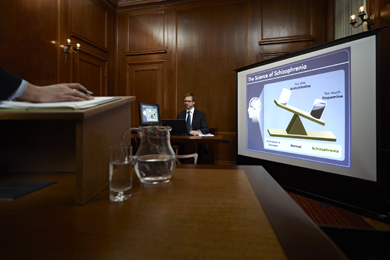Understanding Test Discussion: Tips for Engaging and Persuasive Court Room Approaches
In the world of test presentation, the ability to involve and convince is vital. A successful courtroom strategy depends upon comprehending the audience, crafting an engaging narrative, and employing reliable visual help. Additionally, the nuances of body movement and the importance of method can not be overlooked. Each of these components plays a crucial function fit the jurors' understandings and decisions. The difficulty lies in perfectly integrating them into a cohesive presentation. What strategies can absolutely boost a test presentation from regular to outstanding?
Comprehending Your Audience
To efficiently understand trial presentation, it is critical to comprehend your target market. Recognizing their demographics, backgrounds, and prospective prejudices can help tailor your discussion to reverberate with them effectively.

An understanding of the court's choices and court decorum is just as important, as it can impact the flow of your discussion. Juries might focus on brevity and clearness, so offering your instance in a straightforward manner can enhance your integrity. Additionally, acknowledging the rival advice's methods can help in preparing counterarguments that efficiently address their points.
Ultimately, recognizing your audience permits you to involve them better, cultivating connection and persuasion throughout the trial (trial presentation). By leveraging insights regarding their inspirations and expectations, you can produce an engaging presentation that resonates and ultimately affects the end result of the instance. This fundamental understanding is necessary for any kind of lawyer aiming to attain success in the court
Crafting an Engaging Story
A well-crafted narrative works as the foundation of an efficient trial discussion, guiding the target market with the complexities of the situation. This story must be structured to involve jurors psychologically and intellectually, making the truths relatable and easy to understand. By weaving with each other the components of the instance-- such as the timeline, crucial occasions, and pivotal testaments-- attorneys can create a meaningful story that resonates with jurors.
To attain this, it is necessary to determine the main styles that will certainly drive the story. Attorneys should concentrate on the motivations and goals of the events entailed, showing the human elements of the instance (trial presentation). This technique not just maintains juror passion however additionally promotes empathy, leading them to connect directly with the story
Each sector of the story should build towards an engaging orgasm, finishing in a convincing verdict that reinforces the instance's core message. Inevitably, a solid story not only clarifies the concerns at hand but likewise develops a long-term impact that can affect the end result of the test.
Making Use Of Aesthetic Aids Efficiently
How can aesthetic help enhance the effectiveness of a test discussion? Visual help offer as effective devices that can significantly enhance juror understanding and retention of complicated info - trial presentation. When over at this website utilized attentively, they can clear up essential factors, highlight relationships, and emphasize crucial proof that sustains the situation narrative
Effective aesthetic help consist of graphes, charts, timelines, and images, which can simplify complex data and provide context. As an example, a timeline can succinctly convey the series of events, while a chart can highlight analytical info in a visually engaging manner. The critical use of multimedia presentations can likewise enhance engagement and maintain juror passion throughout the trial.
Moreover, aesthetic help can aid to evoke emotional feedbacks, reinforcing the human components of a situation. By offering photos or videos appropriate to the case, attorneys can develop a much more engaging and relatable story. Nonetheless, it is vital to make certain that aesthetic help are properly created and not extremely complicated, as this can lead to confusion instead than clarity.
Engaging Body Language Strategies
Visual aids are not the only tools that can boost the effectiveness of a trial discussion; engaging body language techniques additionally play an essential function in catching juror attention and sharing confidence. A presenter's nonverbal cues can significantly affect jurors' understandings and reactions, making it important to understand these techniques.

Moreover, varying your vocal tone and pace can improve your storytelling, making it a lot more compelling. Pausing strategically allows jurors to absorb crucial details and indicates the value of what you are Go Here stating. Relocating actively within the courtroom can aid enhance your factors, provided it does not sidetrack from your message.
Including these body movement methods will certainly not just enhance your court existence however likewise promote an even more persuasive connection with jurors, eventually adding to the success of your test presentation.
Practicing for Impact
Effective test discussions hinge not only on the content yet also on the shipment, making practice crucial for influence. The significance of rehearsal can not be overstated; it enables attorneys to improve their debates and establish a powerful presence in the court. Taking part in deliberate technique assists lawyers to recognize their strengths and weaknesses, allowing them to readjust their pacing, tone, and body language accordingly.
To exercise for effect, imitate trial problems as closely as feasible. This consists of making use of visual aids, practicing in front of colleagues, and obtaining constructive feedback.

Final Thought
Mastering test discussion involves a diverse approach that combines audience understanding, narrative advancement, visual help, and body language. These components function synergistically to create an influential courtroom experience. By effectively involving jurors through clear narration and impactful visuals, and by employing certain body movement, trial advocates can significantly improve their arguments. Strenuous method in simulated settings better solidifies these strategies, making sure that each discussion reverberates and leaves a lasting perception on the jury.